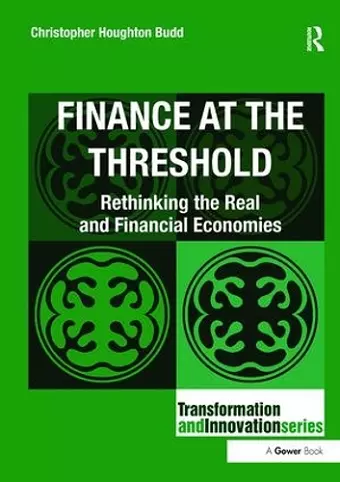Finance at the Threshold
Rethinking the Real and Financial Economies
Christopher Houghton Budd author
Format:Paperback
Publisher:Taylor & Francis Ltd
Published:25th May '17
Currently unavailable, and unfortunately no date known when it will be back
This paperback is available in another edition too:
- Hardback£145.00(9780566092114)

Every banking crisis, whatever its particular circumstances, has two features in common with every previous one. Each has been preceded by a period of excessive monetary ease, and by ill thought out regulatory changes. For many the recent hiatus in inter-bank lending has been seen as a blip - enormous in size and global in scope, but, nonetheless, a blip. Finance at the Threshold offers a unique perspective from an English economic and monetary historian. In it the author asks: Why did the banks stop lending to one another, and why now? Was it merely a matter of over-loose credit due to the relaxation of traditional prudence, or did global finance find itself at its limits? Have government bail-outs saved the day or merely postponed the problem? Christopher Houghton Budd offers a radical view of the global financial crisis, spanning a wide gamut of current thinking. He argues that we need, above all, to overcome the left-right divide so much taken for granted today, and promote financial literacy to young people. His contribution to the Transformation and Innovation Series claims that global finance has brought us to the limits of what mechanistic economic explanations can capture. New ideas and above all new instruments are needed so that innovation can shift from its dexterous exploitation of inefficiencies and turn its attention instead to fresh initiative. Finance at the Threshold is essential reading for academics and practitioners concerned with financial and economic policy and needing to develop a sense of the history thus understanding the forward prospects for global finance.
'Christopher Houghton Budd's approach is unconventional and always interesting. He tackles big and difficult questions in a challenging way which should not be dismissed lightly. It is all clearly written and lucidly explained and students of economics will not see much like this and will benefit from the challenge.' - Forrest Capie, Professor Emeritus, CASS Business School, City University, London 'This well written and thought-provoking book will prompt its readers to reconsider their ideas on money, on credit, on banking, and on the role of government....’ From the foreword by Geoffrey Wood, Professor of Economics, Cass Business School, London '...a book that is intended to challenge our thinking about economics, by deepening our understanding of the role of finance and banking in a functional global economy...it is a publication that will infuriate some economists, accountants and bankers because it will scratch an itch they have about the value of what they do - which they dare not acknowledge. The same discomfort will apply to academics, especially in Finance Departments and Business Schools that have not challenged their leading assumptions for decades...Finally, politicians...Chapters 7 to 12 should provide a fresh perspective for examining the symptoms in order to treat the malaise. Open-minded think tanks, in particular, will be grateful for new models to test against the evidence of the failure of banking.' - John Carlisle, Visiting Professor, Sheffield Business School. Chairman, Alliance of Deming Consultants and Cooperation Works Ltd, Sheffield
ISBN: 9781138094628
Dimensions: unknown
Weight: 480g
258 pages